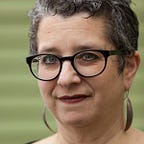Love and Anorexia
It began with an email, one that dropped into my inbox from someone I did not know. Over the years of our correspondence her email names and address changed, from Azhe’n to Be Love to Opus Literati to Private Soulstice. Eventually she trusted me enough to give me her real name; I’ll call her Sue.
Many people write to me because I published a book about helping my daughter recover from anorexia. They write looking for help, for guidance, for validation. With most I exchange a couple of emails, point them toward real-life help and support if I can, remind them that they’re not alone and that there is a path forward, though it’s rocky and hard to find. But that’s not how it went with Sue.
She was a writer. I knew that before she told me, because despite the physical and psychological pain that constricted her life, her words were eloquent and expansive and utterly gripping. She sent poems as she wrote them and they were the work of a young poet trying to find her voice, despite the fact that she was in her late 30s then. Anorexia and other traumas had interrupted her life, and though she believed she deserved nothing, was unworthy and unlovable, something in her refused to give up.
Our relationship broke the usual dynamic where I was the helper, the mentor, the giver of advice and comfort. She was 12 years younger than me but we connected as equals. With Sue I could not stay in the box I’d made for myself. I didn’t want to.
We wrote back and forth for months. As a veteran she had to go through the Veterans Administration for health care, and she had a lot to say about the frustrating impossibility of getting the VA to treat an eating disorder. She jeered at the blindness of her doctors, how they told her to just eat more and she’d be fine. I knew she longed for them to help her even as she disparaged them. We argued about whether recovery was possible for someone like her, who had been sick since she was 13.
After a year of emails I invited her to stay with me for a week so I could feed her as if she was my daughter. She got off the plane late one summer night, a tiny figure in an oversize sweatshirt despite the 90-degree heat. That was not an easy week for either of us. As she’d promised me, she ate everything I put in front of her without complaint. We drank milkshakes in coffeeshops and talked about literature over plates of pasta at my kitchen table. She told me about her divorce; I told her about watching my daughters grow up in a world that seemed bent on breaking them.
At the end of the week we hugged good-bye at the airport. I could feel every vertebra in her spine, the slow beat of her struggling heart. We both knew it would take much more than a week to rout the demon that consumed her. Starvation had squared her jaw and stolen her body. At times it clouded her mind. But it didn’t shrink her spirit. It never eroded her generosity or kindness.
As long as she trusted me enough to share even a little bit of her life I knew I would keep answering her emails. And for the next eight years that’s what we did. I cried at my desk when her dog died, and laughed out loud at videos of the new pup. She sent me a handmade card and a box of tea when my husband was diagnosed with cancer. On a few very bad nights, when her terror and pain overrode her ingrained stoicism, we talked on the phone. After an hour I would hang up, relieved at being able to walk away from her suffering and guilty for feeling relief.
There was only one way the relationship could end. Last month, after a longer than usual silence, I googled her name and found her obituary. It didn’t list a cause of death but I knew what had finally killed her. Whether it happened through starvation or heart attack or suicide doesn’t matter; I know, just as Sue knew, that anorexia had finally finished taking her life.
Of all the illnesses that can damage a human being, anorexia is one of the deadliest. It has the highest mortality rate of any mental disorder; 20% of those deaths come from suicide. Anorexia breaks its victims’ bodies, minds, families, and communities. It isolates people. It destroys them from the inside out.
On this World Eating Disorders Action Day, think of Sue. Think of her creativity, her strength, her suffering. Think of the fact that there are thousands of Sues in the world. They come from every income bracket and ethnicity. They are women and men, adults and children, heterosexual and LGBTQ. They are human beings. People don’t choose anorexia; it chooses them.
We can respond with advocacy for better treatment, more support, more understanding. But really, the only response worth a damn is love.
